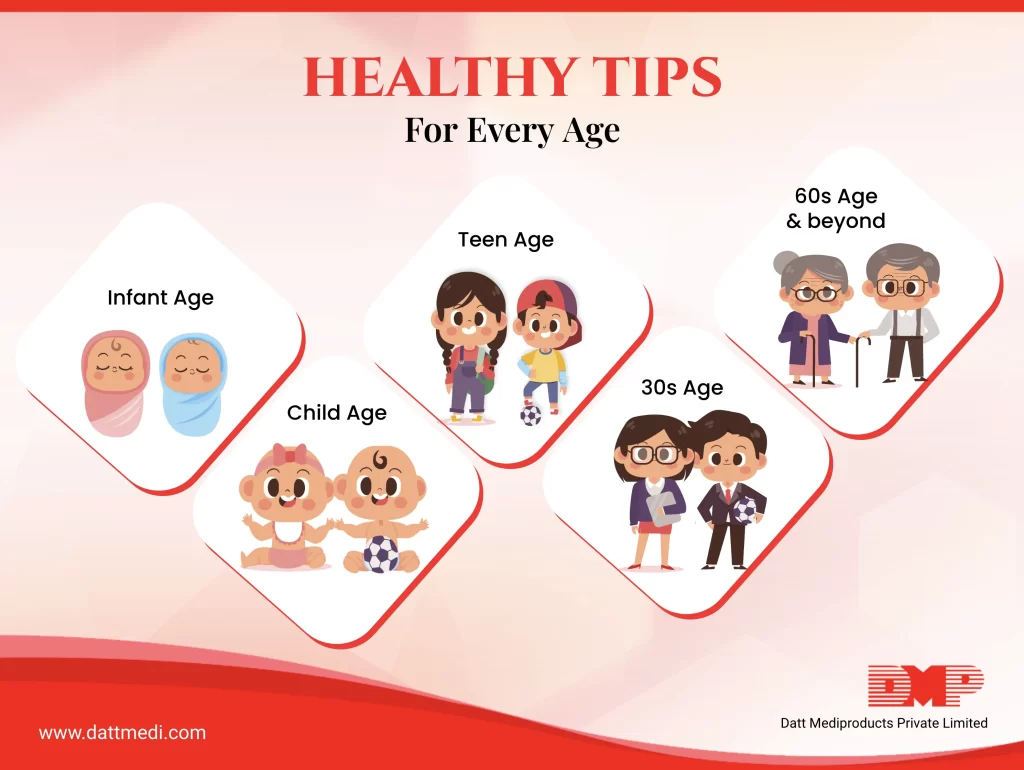
“Good health is not something we can buy. However, it can be an extremely valuable savings account.” – Anne Wilson Schaef
Staying physically and mentally active is another pathway to healthier life. There are many changes that occur as we age (progress in life) and it becomes very crucial to know them and take necessary steps to protect our health.
Special attention as per age:
A. Infant Age –
Young ones need a lot of care and attention, so being parent play, talk, laugh, and sing with your child, all such activities helps the brain to develop stronger, faster and better. Some of the age old suggestions are
-Maintain proper hygiene
-Wash hands properly
-Vaccinate kid as per the schedule
-Daily 30-60 minutes early morning sunlight exposure is sufficient to replenish daily Vitamin D requirement which is very essential for young ones
-Supplement your kid with iron, Calcium and Multivitamins, as advised by the doctor
-Choose toys wisely for proper hand eye coordination, motor skills development
B. Child Age –
Kids tend to follow what all happens in their surroundings. They take their parents, siblings as their role-models. What so ever they observe on daily basis becomes their habit.
Nehru Ji rightly said, “The children of today will make the India of tomorrow. The way we bring them up will determine the future of the country.”
Try implementing these health tips to make them understand importance of being healthy from young age.
-Snacking is not a problem, but choose healthy snacks
-Have meals on dining table with no focus on mobiles and television
-Do not skip meals
-Brush teeth twice a day
-Wash hands before eating
-Playing outside in parks and grounds is not only good for proper brain development but also impacts vision
-Cut down screen time by involving them in some age appropriate activities like drawing, painting, skating, or joining some hobby class
A study published in 2021 stated that 91.9% children experienced changes in terms of nutrition, sleep, television-internet use, social activity, coursework time, and school success due to the pandemic. So it becomes parents’ duty to protect and improve children’s mental health and prevent them from getting obese.
C. Teen Age –
65% of the adult death is due to life style diseases, and the behaviour we adopt at young age is the cause of those diseases.
Being a teenager pay attention to these –
-Physical fitness includes balanced diet, regular exercise, enough sleep and avoiding teeth and gum problems
-Mental fitness says balancing emotions and stressful situations well to have a stable school, work and social life
-Avoid the use of alcohol, tobacco, drugs. This accounts for Behavioural health
-Be media smart and be aware of the tricks ads use to influence, like “teens need”, favourite celebrity in advertisement
D. 30s Age –
Uncertainty due to Pandemic has led to rise in stress levels. A study shows that, “Indian professionals suffer higher stress level than most workers globally”. Some healthy habits that should be a part of our routine to keep away work stress are:
-Start your day with yoga and exercise
–Cut down sugars and refined carbs for better digestion and prevent constipation
-Track your weight – Body Mass Index (BMI) , waist size
-Mindful eating and be aware of what you eat
-Learn to manage stress with meditation
-Do what you like and Don’t try to make others happy all the times
E. 60s Age and beyond –
As we age, immune system gets compromised, lowered bone density, Neurodegenerative disorders etc all occur. So, just to be healthy and mentally active follow these:
– Eat right and exercise
-Supplement diet with essential vitamins and minerals, as advised by the physican
-Keep brain active by solving puzzles, participating in quizzes
-Schedule health checkups to know your body requirements
-Socialize and Indulge in any volunteering activity, join a morning walk group
Staying healthy is not a day project. And amidst pandemic it is important to have a healthful body that requires proper diet, regular exercise, ample sleep, and staying away from bad habits.
Apart from the above we @dattmediproducts would advice to get vaccinated against Corona under specific age groups and prevent severe illness.




